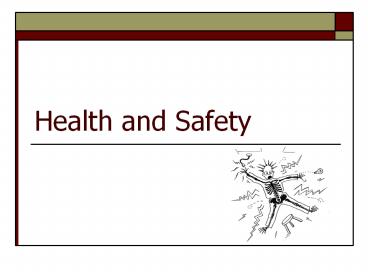Health and Safety - PowerPoint PPT Presentation
1 / 19
Title: Health and Safety
1
Health and Safety
2
Potential Hazards
- Something about the working environment,
equipment or working practices which may cause
harm - Examples
- Trips, slips and falls
- Fire
- Lifting and carrying
Trailing cables, open filing cabinet drawers,
spilt liquids
Overloaded power sockets, flammable liquids
Heavy item, blocking view, carrying too much
3
Dealing with Accidents
- All organisations must know how to deal with
accidents. - Each accident must be recorded on an ACCIDENT
REPORT FORM - A summary of all accidents that happen in the
organisation is recorded in the ACCIDENT BOOK
4
Accident Report Form
What do you think this form should contain
- Name, date of birth and job position of injured
person - Date and time of accident
- Place of accident
- Brief description of accident
- Details of injury
- First aid treatment given (if any)
- If taken to doctor/hospital
- Date form was completed
5
Reporting Faulty Equipment
Before using any equipment staff must be trained
on how to use it. If equipment is not used
properly or is faulty it can be dangerous.
If a piece of equipment was faulty what would you
do?
Question
6
Answer
- Switch off and unplug the faulty equipment
- Place a notice on the equipment warning staff
not to use it - Report the fault to your supervisor or safety
officer - Complete a Hazard/Fault Report
7
General rules for preventing accidents happening
- Employees should follow guidelines in the
employers Health and Safety Policy - Workstations, floors and passageways should be
kept tidy and clear - Documents that are no longer required should be
filed
8
Continued
- Liquids should not be placed near electrical
equipment - Bins should be emptied regularly
- Wire management safe storage or concealment of
cables and wires - All emergency and evacuation procedures must be
followed
9
Health and Safety Legislation
- A number of laws have been passed to make sure
that organisations meet certain standards. - If they do not meet these standards they are
breaking the law.
10
The main Acts are
No need to copy this slide
- Health and Safety at Work Act (HASAWA) (1974)
- Health and Safety (First Aid) Regulations (1981)
- Health and Safety (Display Screen Equipment
(1992) - Reporting of Injuries, Diseases and Dangerous
Occurrences Regulations (RIDDOR) (1995)
11
Health and Safety at Work Act (HASAWA) (1974)
Responsibilities
- Employers must
- Ensure the workplace is safe
- Identify safety hazards in the workplace
- Deal with any safety hazards
- Provide suitable safety equipment
- Regularly maintain safety equipment
12
Responsibilities - continued
- Employees must
- Take care of the own and others health and
safety - Use all safety equipment provided
- Not misuse safety equipment
- Co-operate with employers on health and safety
matters
13
Health and Safety (First Aid) Regulations 1981
- Employers must
- Appoint a qualified first-aider
- Keep records of all incidents
- Have a first-aid box available
- What items should be kept in a first aid box?
Think
14
Reporting of Injuries, Diseases and Dangerous
Occurrences Regulations (RIDDOR) 1995
- Incidents of death, injury or disease must be
reported to the appropriate authority - Incidents must be reported within 10 days
- Can be used to monitor areas of danger
15
Health and Safety (Display Screen Equipment)
(1992)
- Employers must
- Assess workstation and reduce risks
- Ensure workstation meets minimum requirements
- Arrange eye tests
- Provide training
- Organise daily work to allow for regular breaks
16
Computer Health Hazards
- EYE STRAIN AND HEADACHES
- Solved by
- providing anti-glare screens
- Fitting blinds to prevent glare
- Providing regular breaks or changes in activity
- Arranging eye tests
17
- REPETITIVE STRAIN INJURY (RSI)
- Solved by
- Providing wrist rests
- Introducing regular breaks
- Adjusting the layout of the workstation
18
- BACKACHE
- Solved by
- Providing an adjustable chair
- Introducing regular breaks and changes of
activities
19
- STRESS
- Solved by
- Introducing a variety of tasks
- Organising suitable training
- Monitoring workload































